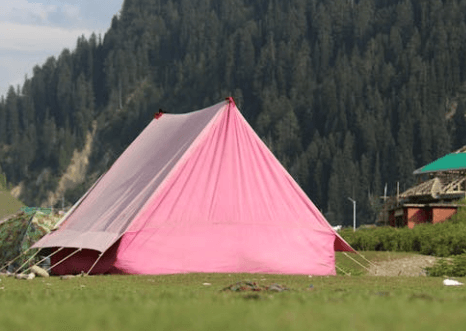Learning how to start a campground on your land can be a fantastic way to turn your property into a profitable venture. With the outdoor recreation industry generating over $689 billion annually in the U.S., the demand for unique camping experiences is booming. Renowned real estate investors and land buyers for cash, Steve Daria and Joleigh, highlight that starting a campground is not only a smart investment but also a way to create a steady income stream. Whether you own a small plot or acres of land, you can transform it into a destination for campers seeking adventure and relaxation. From understanding zoning laws to setting up essential amenities, there are clear steps to follow when learning how to start a campground on your land. Steve and Joleigh recommend focusing on location, creating a memorable experience, and marketing your site effectively to stand out in the competitive camping market. Ready to take the first step? Book a free discussion with our experts today to turn your vision into reality and unlock your land’s full potential!
What are the benefits of starting a campground on your land?
Starting a campground on your land comes with many benefits, both financial and personal.
It allows you to turn unused or underutilized land into a steady source of income.
With the growing popularity of outdoor recreation, more people are seeking unique camping experiences, making it a great time to enter the market.

Operating a campground allows you to bring your unique vision to life, whether you cater to RV enthusiasts, traditional tent campers, or those seeking luxurious glamping experiences.
Additionally, it can increase the overall value of your property by adding infrastructure and amenities.
Beyond the financial rewards, it’s an opportunity to connect with nature and create a welcoming space for others to enjoy the outdoors.
Foster lasting customer loyalty by providing outstanding service and crafting memorable experiences.
If you’re ready to start a campground on your land, it’s a rewarding way to combine business with the beauty of nature.
Get Started: Get Your Cash Offer Below…
We are direct land buyers. There are no commissions or fees and no obligation whatsoever. Start below by sharing where your property is and where we can send your offer…
How much land do you need to start a campground?
The amount of land you need to start a campground depends on the type of camping experience you want to create.
For a small campground with just a few tent sites, you may only need 1 to 2 acres.
However, if you plan to include RV sites, glamping options, or recreational areas, you’ll need more space to accommodate these features.
A good rule of thumb is to allocate at least 1-2 acres for every 10 campsites to ensure privacy and room for amenities.
The layout of your land also plays a big role, as uneven terrain, wetlands, or natural obstacles can limit the usable space.
Additionally, local zoning laws and regulations may require a minimum land size for operating a campground; therefore, it’s essential to check with your local authorities.
By carefully evaluating your property and planning your layout, you can determine the amount of land required to establish a campground on your land.
This will help you create a comfortable, enjoyable space for campers while maximizing the potential of your property.
What are the costs involved in setting up a campground?
- Land Preparation Costs: Preparing your land is one of the first steps, which includes clearing trees, leveling the ground, and creating access roads. The costs typically vary between $2,000 and $10,000, depending on the size and condition of your property when you start a campground on your land.
- Utility Installation: Installing water, electricity, and sewer systems is essential for most campgrounds. Depending on the location, costs typically range from $500 to $5,000 when you start a campground on your land.
- Permits and Licenses: To operate a campground legally, you must obtain the necessary permits, zoning approvals, and business licenses. While these requirements vary depending on your location, the initial costs typically range between $500 and $5,000.
- Amenities and Facilities: Building restrooms, picnic areas, fire pits, and other amenities can significantly add to your expenses. Plan to invest between $10,000 and $50,000, depending on the level of quality and the range of facilities you wish to provide.
- Marketing and Signage: Promoting your campground through advertisements, websites, and signage is crucial to attracting campers. Marketing expenses typically fall between $1,000 and $5,000, varying based on your chosen strategy and the platforms utilized.
What amenities should I include in my campground to attract campers?
When you start a campground on your land, including the right amenities is key to attracting campers and ensuring they have a great experience.
Basic facilities, such as clean restrooms, showers, and access to drinking water, are essential for comfort and convenience.
Adding picnic tables, fire pits, and grills can enhance the camping experience, giving campers spaces to relax and enjoy meals outdoors.
For RV campers, providing hookups for water, electricity, and sewage is a must-have feature that will make your campground more appealing.
Offering Wi-Fi can also be a great perk, as many campers like to stay connected even while enjoying nature.
Recreational amenities, such as hiking trails, a playground, or a small fishing pond, can set your campground apart and provide additional activities for guests.
To attract glampers, consider adding luxury options such as furnished tents, cozy cabins, or even hot tubs for a more upscale experience.
By offering a mix of practical and fun amenities, you can create a welcoming and memorable space that appeals to a wide range of campers.
What permits and licenses do I need to operate a campground?
- Zoning Permits: A zoning permit is required to ensure your land is approved for campground use. Check with your local zoning office to confirm if you can start a campground on your land and meet all the necessary requirements for your area.
- Business License: A business license is essential for operating your campground as a legitimate business. This license typically costs between $50 and $500, depending on your location, and allows you to run your campground officially.
- Health Department Permits: If your campground includes restrooms, showers, or food services, you’ll need permits from the health department. These permits ensure that your facilities meet sanitation and safety standards, which are critical when starting a campground on your land.
- Environmental Permits: If your campground affects natural resources like wetlands, forests, or water sources, you may need environmental permits. These permits are essential for protecting the environment while ensuring your campground complies with local and state regulations.
- Building Permits: If you’re constructing facilities such as restrooms, cabins, or utility hookups, you’ll need building permits. These permits guarantee that all structures comply with local building codes, ensuring safety and creating a secure environment for your campers.

What steps should I take to officially open my campground?
To officially open your campground, there are several important steps to follow.
First, ensure that your land is properly zoned for campground use and obtain all necessary permits and licenses, including zoning, health, and business permits.
Next, prepare your property by clearing the land, setting up campsites, and installing essential utilities, such as water, electricity, and sewer systems.
Once the basics are in place, focus on adding amenities such as restrooms, picnic areas, and fire pits to enhance the overall camping experience.
Marketing is also key—create a website, list your campground on travel platforms, and use social media to attract visitors.
Don’t forget to establish clear rules and safety guidelines to ensure a smooth operation.
Before opening, do a final walkthrough to check that everything is ready and meets local regulations.
When you’re confident in your setup, plan a grand opening event to welcome your first campers and spread the word.
If you’re ready to start a campground on your land, take the first step today by researching local requirements and creating a solid plan.
With the right preparation, you can turn your property into a thriving destination for outdoor enthusiasts!
Takeaway
- Plan Your Layout Carefully: Design your campground to include well-spaced campsites, easy access roads, and essential amenities. A thoughtful layout ensures a comfortable and enjoyable experience for campers.
- Secure Permits and Licenses: Obtain zoning, business, and health permits to operate your campground legally. These are crucial steps to take when starting a campground on your land and avoiding legal issues.
- Invest in Basic Amenities: Provide clean restrooms, showers, and drinking water to meet campers’ basic needs. Adding fire pits, picnic tables, and RV hookups can enhance the appeal of your campground.
- Market Your Campground Effectively: Use social media, travel platforms, and a dedicated website to promote your campground. Good marketing helps attract campers and build your reputation.
- Focus on the Camper Experience: Offer recreational activities, such as hiking trails or fishing ponds, to make your campground stand out. A great experience encourages campers to return and recommend your site to others.
**NOTICE: Please note that the content presented in this post is intended solely for informational and educational purposes. It should not be construed as legal or financial advice or relied upon as a replacement for consultation with a qualified attorney or CPA. For specific guidance on legal or financial matters, readers are encouraged to seek professional assistance from an attorney, CPA, or other appropriate professional regarding the subject matter.
